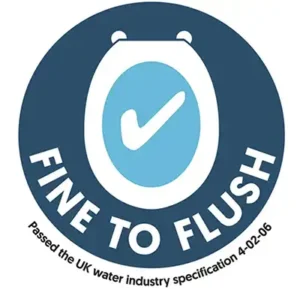IN YOUR BATHROOM
Bin the nasties
Wipes, condoms, sanitary products, cotton wool, and dental floss are some of the biggest offenders in our sewers. Throw them in the bin, not the loo. The three Ps is the best rule to remember when it comes to what’s flushable; pee, poo, paper. Nothing else!
Switch it up
There are loads of alternatives to wet wipes and sanitary products on the market now. Why not try a few? You’ll be helping the planet in more ways than one.
Myth: ‘Flushable’ products are safe to put in the loo
Many companies market products as ‘flushable’. But these wipes contain plastic, so they won’t break down the same way as toilet paper does. Although they’ll disappear when you flush, they won’t completely leave your drains. Pop them in the bin to be safe. Even the wipes with the ‘Fine to Flush’ mark can cause problems.
– https://www.bbc.co.uk/news/newsbeat-61922999
– https://www.thetimes.com/uk/environment/article/clean-it-up-flushable-wipe-certifications-industry-s760gnnj0

Do not flush even with this mark.
In your kitchen
Lovely leftovers
Resist the temptation to tip old food down the kitchen sink and be sure to scrape it in the bin. If it’s more of a ‘liquid’ food like gravy, use some kitchen roll or newspaper to soak it up, then put it in the bin.
Fat, oil and grease
Cooking fat and oils will eventually turn solid and build up in your pipes. Instead of pouring them down the sink, collect them in a container like a jam jar or yoghurt pot. Leave them to cool, and once they’ve set, scoop them out and pop them straight in the bin.
Myth: Hot water and soap will break down oils and fats, keeping the pipe clear
If you’ve blocked your drain, crossed fingers and a squirt of washing-up liquid won’t clear it. That’s because hot water and soap don’t dissolve oils and fats. The soap may actually harden in your pipes, sticking to other items and adding to the problem.
